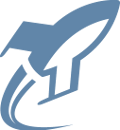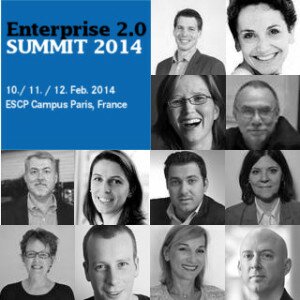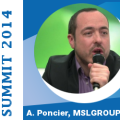 Today, Peter Vander Auwera answers the questions in our pre-conference interview series.
Today, Peter Vander Auwera answers the questions in our pre-conference interview series.
When you talk about Peter, you have to talk about innovation, enthusiasm and being a rebel. But, there’s more to him. He’s also an independent thinker, an event organizer, co-initiator of Corporate Rebels United, member of Change Agents Worldwide, he’s a speaker and he has an unquenchable urge to challenge the status quo.
Peter joins Dion Hinchcliffe and Marie Taillard on the #e20s stage in the afternoon of the second day (or the third day, if you visit the Masterclass Workshops). Peter, Dion and Marie will man the keynote panel and talk about the “Framework of the Social Enterprise & the Future of Work“.
1) Peter, you will be speaking at the Enterprise 2.0 SUMMIT in Paris – what are your three tags that your talk can be labeled with?
- Movement
- Rebels
- Value Creation
2) What is the idea of the corporate rebel? Is this a new word for social evangelist/enthusiast?
No, the idea of Corporate Rebels United is almost the opposite. We love and care for the organizations and networks that we work for and we want them to succeed. We want to reboot our corporate and organizational culture to install a 21st century, digitally native, networked and humanistic version, to accelerate positive viral change from deep within the fabric of our organizations, and to reclaim our passion for meaningful work.
The ultimate goal is to find, articulate the drivers and values of “a modern, 21st century organization” and to live, promote, and breathe them every day in our own organization and networks. Our ambition is not only be a chat-club or another echo chamber of evangelists; our ambition is to be very actionable and to have real impact on all levels of our organizations.
3) What are the key characteristics of a corporate rebel?
We are people taking agency, empowering ourselves, not letting ourselves empowered by others. We are not catalysts nor evangelists or “change agents”; we are activists and do-ers.
To quote Nilofer Merchant in her 2011 HBR post, we are protagonists.
“To rebel is to push against something. To lead is to advocate for an idea. To rebel is to say “heck no.” To lead is to say “we will.” To rebel is to deny the authority of others. To lead is to invoke your own authority. A protagonist is a principal champion of a cause or program or action. The protagonist does not wait for permission to lead, innovate, or strategize. They do what is right for the firm, without regard to status. Their goal is to do what’s good for the whole. Protagonists help organizations become more competitive. After all, the word compete comes from the Latin com petire, which means “to seek together.” Their intent is to not to antagonize, but to drive towards something. Protagonists are willing to name things others don’t yet see; they point to new horizons. Without them, the storyline never changes.”
On our website (www.corporaterebelsunited.com) we have documented 20 common principles that define who we are and what we stand for. A couple of examples:
- Principle-1: We love our organizations and want them to succeed in this high-velocity, hyper-connected world.
- Principle-2: We dare to be great.
- Principle-3: We have the mandate to be brave and to challenge the status quo.
One other characteristic is that we are relentless. This is reflected in our manifesto:
Challenging the status quo
Relentlessly
Breaking the rules
Saying the unsaid
Spreading the innovation virus
Seeding tribal energy
With a cause to do good
Leading by being from our true selves
Going after the un-named quality
With no fear
Relentlessly
4) What is the function of the corporate rebel in the social adoption and transformation process?
We want to create a set of practices (plural) for Value Creation that transform century digital and humanistic eco-systems. It’s “practice” like in Lean “practice” or SixSigma “practice”. However our organizations/networks into 21st these are for increasing efficiency in our organizations. Corporate Rebels Unites is on the innovation side, the value creation side. Innovation is less about “optimizing” the core engine; it’s more about new value creation.
Imagine having “black-belts”, “champions” in value creation and deep transformation of our companies based on our mission and principles. In the end, a company should be proud and outspoken of having x number of “black-belt Rebels” on board!
We want it to be global. From a meta-story perspective, wanting it to be something “global” that holds the values is probably one of the strongest thoughts of our movement. We would like that these practices develop in a self-emerging way through the activities of the self managed cells of people, living the 20 principles we have listed on our website.
Our expectation is that these practices are grounded in following principles:
- Practice of Courage, Fear-is-not-an-Option, No fear to jump
In essence it’s about leveraging the power and energy of people who act from their true selves. Nilofer said; “In this era — the social era — the nugget of value creation starts with a connected human. We call this many things today: a founder, an entrepreneur, an innovator, an entrepreneur… whatever the name, Onlyness is *central* (no longer a nice-to-have) to what gets created. Until you celebrate your own ‘vision of the world’, you’ll be missing out (and so will the rest of the world). Onlyness is one of the 11 rules for the Social Era rules.”
- Behavior/attitude: “Shift Makers”, “Accelerating Purposeful Innovation”, “Inside and Outside the company”, “Accelerators”, “Catalysts”, “Igniters”, carrying “The soul of Innovation”, “Re-Build”, “Re-Work, “Corporate Activists”, “Positive Deviants”
- Emergent from the cells
- Includes stealth approaches
- Practices that lead to mastery
- Focus on what works
- Be part of curriculum
- Certification levels vs. Reputation system
- To be added as program to universitiesCorporate Rebels United soul is about people taking agency. Corporate Rebels United is a movement. It’s a culture, emerging from some specific behaviours.
It’s a tribe of enthusiastic protagonists hungry for change. Positive change.
Not an anarchist tribe, but a tribe of people who care for the companies they work for and want them to succeed in the 21st century of hyper-connectivity. Corporate Rebels United is deeply value and purpose driven. It has an ambition for progress, looking forward. We fight mediocrity, and applaud critical thinking. Corporate Rebels United is a reflection zone. Where new ideas are tossed, curated, discussed, made actionable. We want to give the best of ourselves. For doing good. For creating human connections between people. For letting people discover their hidden talents and powers. For taking people on a path of discovery, individual and collective relevance. We want everybody in the company and industry to think, to be and act responsible to increase value and wealth creation. Moving from ego-systems and creating eco-systems filled with meaning.
Corporate Rebels United is a place where belonging is more important than fitting in. Corporate Rebels United is about leading from the emergent future, in support and co-creation with our markets and regions. Corporate Rebels United is a tribe/swarm for leading by being. To quote Keith Yamashita from SY Partners: “Every leader, at some point in their career, decides whether or not to do the hard work of pursuing greatness. It’s a choice that’s not about satisfying their ego, but about holding themselves and their ambitions to a more enlightened standard of leadership. And it requires the worthy work of showing up as their best self every day, and making a lasting positive impact on their people, teams, customers—even society.”
5) What are the challenges and issues one has to be aware of when following the corporate rebelling pathway?
The main challenge is that the organizational anti-bodies always resist change, to be aware of this, and still keep on fighting.
The challenge is to move beyond some myths of change that sound good in a manifesto, but that have little or no effect in actual viral change at scale in organizations.
The challenge is to act like a real swarm, like a virus that “infects” the organization at scale from deep within its own fabric.
The challenge is to “activate” our people into doing, to create a do-ocracy.
The challenge is to optimize the swarm for speed, trust and scalability between idea and action. The challenge is to make sure that everybody feels included.
The challenge is to maintain one value set and one value base.
The challenge is to be respectful.
The challenge is to be relentless and persistent.
The challenge is to remain kind.
The challenge is to have the courage to stand for your true self, every day again.
Thank you for the interview Peter.
A reminder: Peter joins Dion Hinchcliffe and Marie Taillard on the #e20s stage in the afternoon of the second day (or the third day, if you visit the Masterclass Workshops).Peter and Dion will man the Keynote Panel and talk about the “Framework of the Social Enterprise & the Future of Work“.












9 thoughts on “Peter Vander Auwera: Corporate rebels fight mediocrity, and applaud critical thinking!”